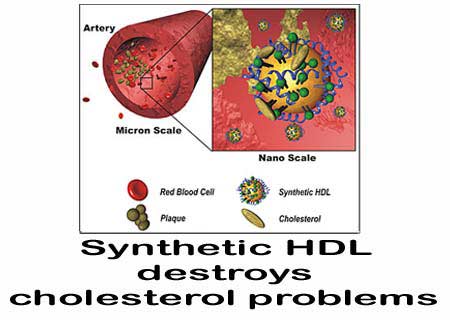Northwestern University scientists have designed synthetic high-density lipoprotein (HDL) that may aid in the fight against chronically high cholesterol levels. This could prevent or curb the fatal heart diseases that take place as a result of high cholesterol levels.
The researchers’ synthetic HDL invention is said to be based on gold nano-particles. This study was led by Chad A. Mirkin, George B. Rathmann Professor of Chemistry in the Weinberg College of Arts and Sciences; and Shad Thaxton, MD, assistant professor of urology in Northwestern’s Feinberg School of Medicine.
Mirkin says that, “We have designed and built a cholesterol sponge. The synthetic HDL features the basics of what a great cholesterol drug should be.†He continues, “Drugs that lower the bad cholesterol, LDL, are available, and you can lower LDL through your diet, but it is difficult to raise the good cholesterol, HDL.â€
The researchers used a gold nano-particle as the core of their invention. This base was later covered with a lipid which was bound to the gold surface, followed by another layer of lipid, and the APOA1 protein. The high-density lipoprotein nano-particles are believed to have a diameter of 18 nanometers. This is apparently the size akin to the natural HDL.
Thaxton says that, “Cholesterol is essential to our cells, but chronic excess can lead to dangerous plaque formation in our arteries. HDL transports cholesterol to the liver, which protects against atherosclerosis. Our hope is that, with further development, our synthetic form of HDL could be used to increase HDL levels and promote better health.â€
Mirkin says that, “HDL is a natural nanoparticle, and we’ve successfully mimicked it. Gold is an ideal scaffolding material — its size and shape can be tailored, and it can be easily functionalized. Using gold nanoparticles, which are non-toxic, for synthetic HDL bodes well for the development of a new therapeutic.â€
This innovative invention is the result of the association of scientists from both the Northwestern department of chemistry and Feinberg School of Medicine.
These scientists state that a deeper analysis needs to be conducted on the synthetic HDL. This invention was supported by the National Institutes of Health Director’s Pioneer Award.
Their findings are published online in the Journal of the American Chemical Society (JACS).

